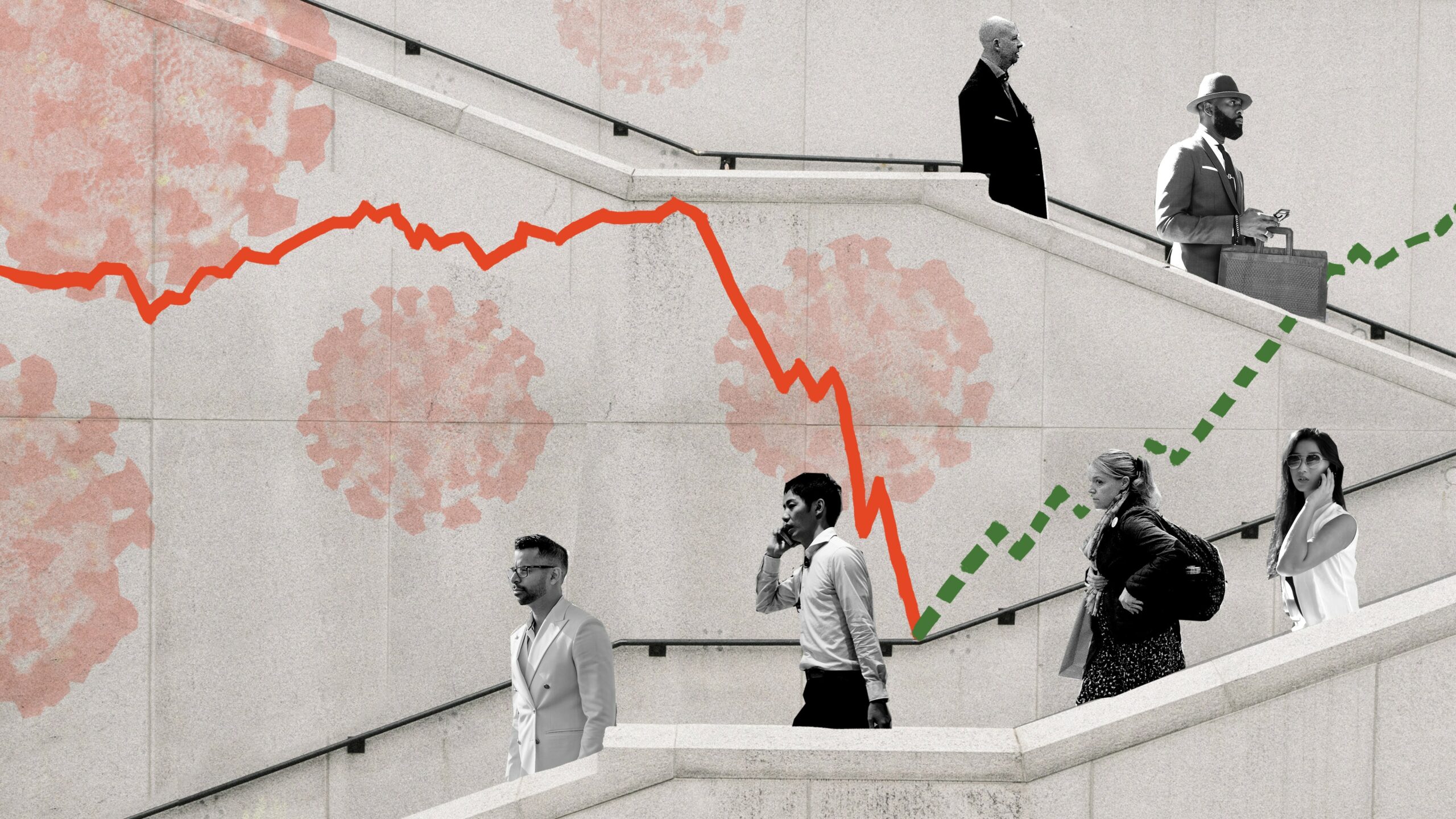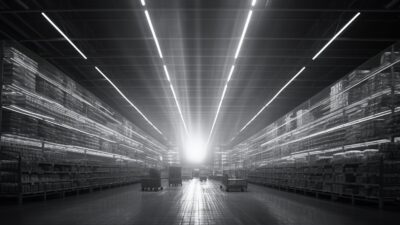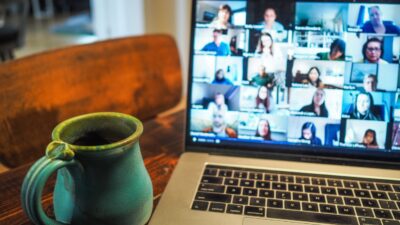Sandra Peter and Kai RiemerSandra Peter, Kai Riemer,
text

Business model changes on Corona Business Insights
We look at how business models have changed in response to the pandemic with businesses seizing new opportunities, making emergency pivots or more sustained adaptations to how they deliver value for customers.
As COVID-19 sets out to change the world forever, join Sandra Peter and Kai Riemer as they think about what’s to come in the future of business.
Shownotes
Our previous discussion of digital contact tracing on Corona Business Insights
Our previous discussion of smart brands with Andrew Baxter on The Future, This Week
Our previous discussions of employee monitoring, employee surveillance and remote work on Corona Business Insights
New business models during the pandemic
How businesses have pivoted during the pandemic
Our previous discussion of business continuity planning on The Future, This Week
F1 team McLaren, Mercedes and others are building 10,000 ventilators for the UK government
The streaming startups trying to save the music industry mid-pandemic
Our previous discussion of live-streaming on The Future, This Week
Caterpillar’s autonomous driving technology pivot
Singapore Airlines sells out meals on parked plane
This episode is part of a podcast series covering what COVID-19 will mean for the business world, where we look at the impact on the economy, businesses, industries, workers and society. This is part of our ongoing coverage of the impact of COVID-19 on the future of business.
Follow the show on Apple Podcasts, Spotify, Overcast, Google Podcasts, Pocket Casts or wherever you get your podcasts. You can follow Sydney Business Insights on Flipboard, LinkedIn, Twitter and WeChat to keep updated with our latest insights.
Send us your news ideas to sbi@sydney.edu.au.
Dr Sandra Peter is the Director of Sydney Executive Plus at the University of Sydney Business School. Her research and practice focuses on engaging with the future in productive ways, and the impact of emerging technologies on business and society.
Kai Riemer is Professor of Information Technology and Organisation, and Director of Sydney Executive Plus at the University of Sydney Business School. Kai's research interest is in Disruptive Technologies, Enterprise Social Media, Virtual Work, Collaborative Technologies and the Philosophy of Technology.
Share
We believe in open and honest access to knowledge. We use a Creative Commons Attribution NoDerivatives licence for our articles and podcasts, so you can republish them for free, online or in print.
Transcript
Intro From The University of Sydney Business School, this is Sydney Business Insights.
Sandra And this is Corona Business Insights. I'm Sandra Peter.
Kai And I'm Kai Riemer.
Sandra And we're back unpacking the impact of COVID-19 on business, the economy, industry, government, workers and society and looking at the effects of the pandemic.
Kai This podcast is part of a larger initiative by The University of Sydney Business School, you can find our COVID business impact dashboard online at sbi.sydney.edu.au/coronavirus.
Sandra And today we're talking about the impact of COVID-19 on different business models.
Kai We have talked a lot in previous episodes about the impact of COVID-19 on various industries. We've looked at cinemas, we looked at the tourism industry, we looked at telehealth and doctors. Today we want to take stock of all the different ways in which businesses have reacted to and found ways to cope economically, and in terms of their business operations with the disruptions that came with the pandemic.
Sandra And there really have been three ways in which business models have changed in the wake of the pandemic. One has been businesses that have seized an opportunity. And some of these were early on in the pandemic, businesses that saw the opportunity to change the types of products and services they offered, or the things that they produced, or business models that have emerged around new opportunities such as contact tracing, or remote work or surveillance.
Kai And those are really, where businesses are fortunate enough to be able to create new products and services for new income sources, for example, but others in the pandemic haven't been so lucky, they had their business operations fundamentally disrupted. And so they had to come up with what we call an 'emergency pivot', to not necessarily sustain the business but keep the business alive, find some source of income, some sort of way to stay connected with customers to survive the pandemic.
Sandra And of course, these have been business models of many companies involved in tourism and hospitality, but also in transport, airlines and so on. A third category of businesses have adapted to the pandemic.
Kai These have been businesses that had their operations disrupted, for example, due to the lockdown due to social distancing restrictions, due to the fact that borders were closed. And they adapted the ways in which they did business. They didn't have to pivot completely. But they had to, for example, find new ways to deliver their products, or to source their products or to interact with their customers, often employing digital technologies to do so.
Sandra Let's have a look at some examples in each of these three categories. But then also try to see whether these changes are temporary changes to the business models that have to do very much with us still being in the midst of the pandemic, or whether these changes are enduring changes that will last after the pandemic and really change the fundamentals of some industries.
Kai So let's start by looking at businesses who seize the opportunity to create new products or new services that played directly to the needs of the pandemic, to the changing circumstances. And one such group we actually discussed on our last episode of Corona Business Insights, and that is IT software companies that created new services, new products for corporate contact tracing solutions that track people on premise, companies that would normally do asset tracking now started tracking people with badges, companies that created enterprise solutions use access to employee data to now provide contact tracing or services for checking in people that visit a company's premises.
Sandra And, of course, in this category, were also the companies that early in the onset of the pandemic reconfigured their manufacturing lines to produce things that were in short supply. So for instance, Four Pillars gin and Archie Rose here in Australia reconfigure their manufacturing lines to produce hand sanitizer. LVMH in Europe produced hand sanitizer on their cosmetics manufacturing lines and offered it in that case for free to the French healthcare system, but also clothing manufacturers such as Zara, repurposed their factories to make masks and hospital gowns. And we'll include in the shownotes an episode we did with our colleague, Andrew Baxter, looking at some of these changes in more detail.
Kai And another example that falls in the same category is the efforts by Formula One team McLaren in a consortium with Mercedes and companies like Rolls-Royce and Airbus, to build 10,000 ventilators back in March/April, when the UK was battling the first wave with an overloaded hospital system. So companies that put their ingenuity, their engineering in their production lines to work to help with the response efforts, but also creating income sources to sustain their main business.
Sandra So apart from this first category of business models that have changed to seize an opportunity, many other companies were forced to make emergency pivots as their main activities were disrupted. And here of course, companies like Qantas or Singapore Airlines who saw many of their flights grounded and had to look for other business opportunities. Singapore Airlines offered a dining service on parked planes. So people had the opportunity to have lunch on a stationary Airbus and paid up to about $500 to eat on a plane.
Kai And for people who really crave the experience of being crammed into an economy seat, juggling food, while also trying to obtain the right distance to watch a movie, that could be bought for as little as 39 bucks.
Kai But other airlines like Taiwan's EVA or our own Qantas also came up with some innovative ways to stay in business.
Kai So Qantas, for example, offered a flight from Sydney to... Sydney. A seven hour flight, basically to the same destination that people took off from and it sold out within minutes, because people were just keen to get back on planes, even with nowhere to go.
Sandra But of course, while airlines did get into the restaurant business, many restaurants around the world really struggled with lockdown laws and social distancing. And this was particularly true of high-end restaurants. So for instance, famed Copenhagen restaurant Noma needed to find a solution to keep their staff employed and their business going. Of course, this is one of the best restaurants in the world. So it decided to reopen as a burger and wine bar back in May, still at the height of the pandemic. So gone were the reservations that took up to half a year to get a table, and in came queuing up for up to three hours to have a meal at their pop-up burger joint.
Kai And another example comes from the hospitality industry and that is hotels, who with lockdowns and travel bans all of a sudden found themselves without guests who would stay the night. So some hotels like the Ovolo here in Sydney, pivoted to opening up their rooms for day rentals for people who wanted to flee busy homelife, who had to work, could then book themselves from nine to five for a working stay at nice hotels with desks and facilities and Wi Fi. So hotels trying to open up as day offices.
Sandra So the pandemic saw many business models seize an opportunity and create entire new lines of products or services. While other companies were forced to make emergency pivots and create new business models from which to continue to make some money during the pandemic, the majority of businesses were forced to adapt to the pandemic. And this is the third category that we want to have a look at today.
Kai So those are businesses who basically continue doing what they were doing but had to find new ways to deliver their services, to source their produce or to connect with customers. So let's take restaurants for example. We've heard from Noma, a high-end restaurant that does degustation sittings, obviously cannot continue what they were doing, had to find entirely new ways of creating their products. But for the majority of restaurants, say pizzerias or burger joints, they would continue cooking the food that they were making, but had to now find ways to deliver their products to customers, and also found some more innovative ways to adapt to the circumstances.
Sandra And that was the case with many high-end restaurants. Rather than just deliver meals at home, they tried to reproduce some of the excitement that people had dining at some of these places, especially the more experimental kitchens, by providing kits that people could make at home. You would get all of the ingredients, some of them pre-prepared, some of them that you had to cook yourself and instructions as to how to reconstruct some of those meals at home.
Kai And some restaurants even combined this with a subscription service where you would get those meals five days a week to prepare healthy straightforward lunches for example, during your work from home workday.
Sandra Many other industries were similarly impacted. For instance, movie theatres were closed down around the world as lockdown drills came in and as social distancing came in. So production companies were forced to think of new ways in which they could distribute their movies. Releases this could not be done in the cinema, so big production companies turn to streaming. So for instance, Disney's Mulan movie was released on Disney Plus before it went into cinemas at a premium cost. Trolls was also released on on-demand, earning almost 100 million dollars in rental fees in the US alone during the first weeks of its release, which of course might signal a bigger shift in the industry with regard to where movies get released first and how long they spend in the cinemas, once they're out in cinemas.
Kai And while Mulan was probably not the best test case, given that it didn't play exactly well with critics and in reviews, there seem to be more streaming releases planned. Apparently, Apple is in discussions to be the launch partner for the new James Bond movie, given that many cinemas in the UK and the US after a short phase of opening up have locked down again, in the face of no major releases, but also a rolling second or third wave.
Sandra And speaking of streaming, streaming has really provided an opportunity for many businesses to adapt their business models. In China for instance, consumers have now gotten used to buying large quantities of products from farming produce, that is vegetables, fruit, flowers, to even buying clothes, makeup, but also houses, cars and even rocket launchers via streaming sales.
Kai So streaming services as a way to keep retail in business but facilitate social distancing.
Sandra And we've seen in China, these adaptations to business models actually persist past the peak of the pandemic and as China moves into the recovery phase. So for instance, selling products via live-streaming now makes up almost 10% of online sales, with people being able to garner huge followings for these live-streaming sales events. For instance, Lipstick Brother No 1 selling makeup over live-streaming, last week alone gathered an audience of about 100 million people buying products recommended by him online.
Kai A hundred million people on a live-stream buying lipstick?
Sandra Indeed, a hundred million. Pointing to the fact that quite possibly many of these adaptations are actually here to stay.
Kai So while emergency pivots and some of the new opportunities might be rather short-lived, while some adaptations might be good to survive a lockdown, we see that a number of adaptations to business models might actually lead to additions that will be more sustainable, maybe not as the main line of business or the main way to interact with customers, but as additional ways to serve customers. And a lot of those innovations are of a digital nature, and streaming is just one of those. We've seen farmers streaming, but we also see in the music industry, for example, new business models, new startups coming up that create interactive live-stream experiences for musicians that cannot at the moment draw a crowd, that allow not only a live-stream music experience, but in-stream shopping of merchandise or interactions between people in the virtual crowd. And we could envision that some of those streaming services would also be able to add to a live experience where the crowd now could be the people in the room or in the stadium, but also people at home who could participate in a live event by way of interacting with each other, or even with elements of the performance.
Sandra And of course there are many other areas where the digital replaced the physical, such as doctors seeing patients, so telehealth really took off around the world over the last few months. In China alone we saw for instance, companies like JD Health or AliHealth or WeDoctor being run by the big companies, by Tencent by Alibaba, Baidu, jd.com, offering services orders of magnitude bigger than before the pandemic. Going up for one such service alone from 10,000 online consults a day to 150,000 consults a day, and many of these moves to the digital space might be here to stay.
Kai In telehealth one of the biggest inhibitors was always the way in which doctors could actually bill for their services. Telehealth, often set outside of the traditional billing system was restricted to very few specialised doctors, but the pandemic really forced the entire system to innovate. And now that these institutionalised problems have been solved, it is more than likely that telehealth will have a permanent place in the portfolio of how we interact with health professionals.
Sandra But before we wrap up this episode, it's important to note that whilst many of the adaptations that we have discussed have been around finding better ways to reach customers or to serve customers. The pandemic has also offered the opportunity for companies to consider making enduring changes to their business model in how they generate revenue. And Spotify, the leading music streaming provider offers a good example in that respect. For Spotify, who should have been thriving in a period where we're all locked in the house and are listening to a lot more music and accessing more of our music content online, this should have been a time of huge revenue growth. But Spotify relies mostly on free users who listen to advertisement, hence a lot of their money came from advertising. Once the pandemic hit hard, many companies and advertising budgets were reduced, it really made apparent a big limitation of their business models. Hence Spotify decided to adapt its offerings by including a lot more original content, in this case in the form of podcasts, including, of course, the one that you're listening to now, and it recruited during the pandemic many artists and users to both create and provide exclusive original content.
Kai And we want to end with another example in this category, which is Caterpillar. Caterpillar, of course, manufactures large construction equipment, diggers and trucks. And while their business wasn't completely disrupted during the pandemic, many of their clients were affected by lockdowns and couldn't have people on their construction sites or in mines. And so Caterpillar accelerated a development of remote control and autonomous vehicle additions to their products, to their fleets, thus not only enabling their clients to stay in business, but also to grow a different revenue source, which is the licencing of software services to create more steady income sources for itself.
Sandra So looking forward and looking at lessons learned from this pandemic for future crisis, organisations can either seize opportunities as they present themselves, make emergency pivots to stay in the game, or adapt and possibly find ways to bring about enduring changes to their business models that outlast the crisis moment.
Kai So the hope is that we can learn from the ways in which business models have changed during this pandemic, to fit into the resilience planning, the business continuity planning of businesses going forward not only for future pandemics, but for crisis of different kinds as well.
Sandra But that's where we want to leave it today.
Kai This was Corona Business Insights. Thanks for listening.
Sandra Thanks for listening.
Outro From The University of Sydney Business School, this is Sydney Business Insights, the podcast that explores the future of business.
Close transcript





